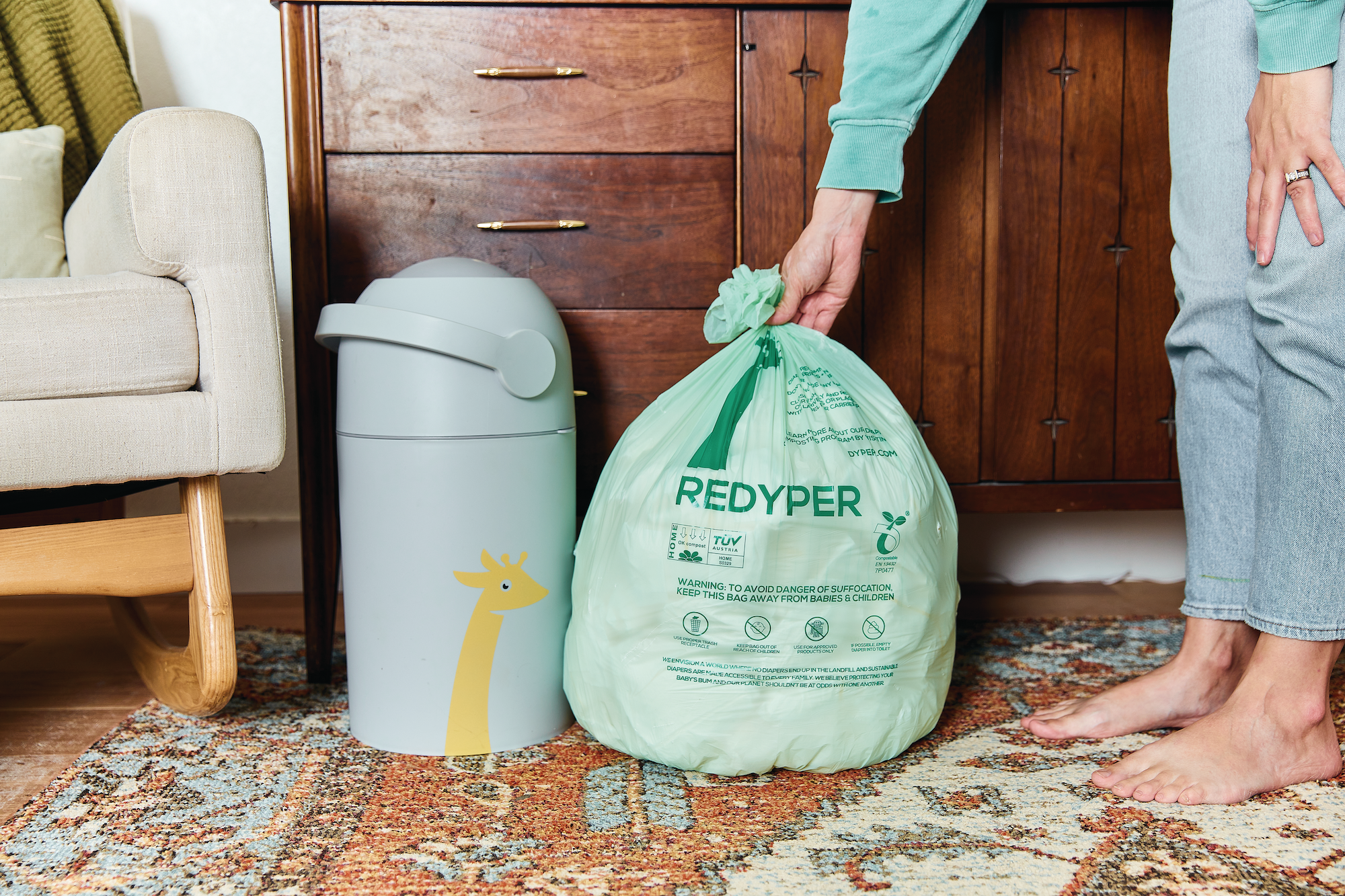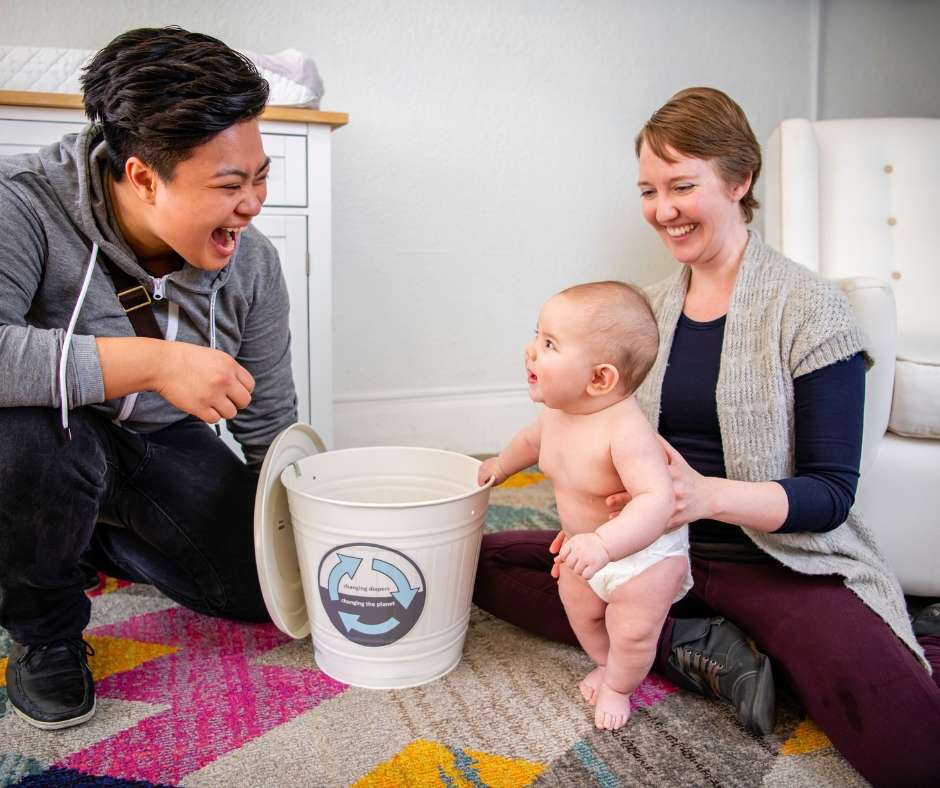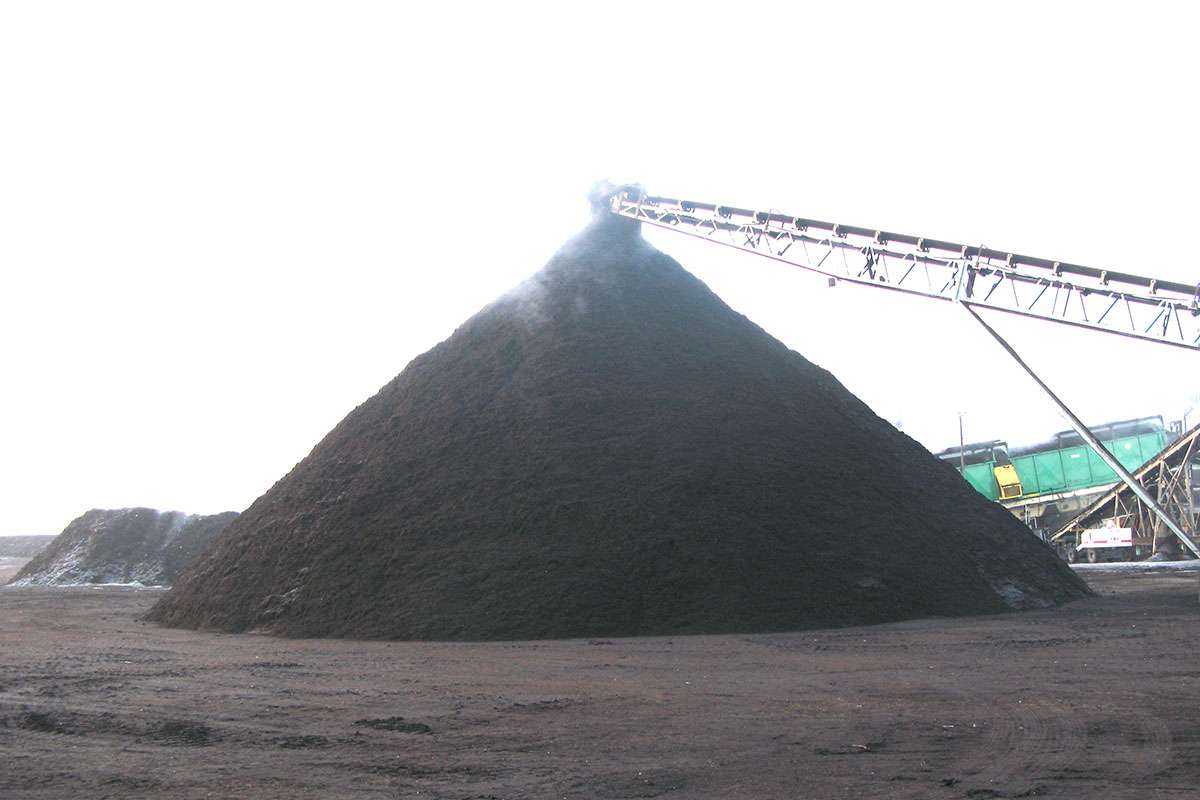
Traditionally, diapers are a dirty business. There’s the obvious stink factor, of course, (how does such a tiny human produce so much poop?!) but there’s another “dirty” side to diapers that most of us don’t think about until we’re knee-deep in disposables.
I have two daughters, ages 11 months and 4 years. It’s safe to say, I have changed my fair share of diapers. When my first daughter was born, I was floored by the sheer number of diapers she went through daily. (Sometimes up to 10 diapers in a single day!)
When you research the number of diapers your littles will use from age 0-3, it gets even more shocking. The average baby will go through 5,000-7,000 diapers. Sheesh. In the Bay Area alone, we send over 300 million diapers to landfills per year.
And when diapers get to the landfill, they don’t just magically go away. It’s quite the opposite, really. They stubbornly sit in the landfill—without breaking down—for hundreds of years.
It takes 500+ years for a diaper to decompose in a landfill. They will outlive you and your great-great-great grandchildren, releasing harmful methane emissions that only exacerbate the climate crisis.
Are you reeling yet? What is an eco-conscious parent to do?
Here’s another dirty side to diapers: Conventional disposables contain a high percentage of petroleum-based ingredients and often contain toxic chemicals that come in contact with your baby’s sensitive skin. These chemicals include phthalates, PVC, chlorine, dioxins, and fragrances that at best irritate your baby’s bum leading to diaper rash and at worst, can have lasting health impacts.
Ok, now for some good news: Not all diapers are bad for the environment and your baby’s skin. And while cloth diapers can be a greener option (depending on how you approach this diapering method), here in the Bay Area you have access to a service that delivers, picks up, and composts diapers. Let’s take a look at this option plus 7 other ways to make your baby’s diapers less sh**ty for the environment. 😉

8 ways to reduce the environmental impact of your baby’s diapers
1. Turn your diapers into dirt!
This is by far my favorite way to reduce the environmental impact of your baby’s diapers. Here in the Bay Area, you can sign up for a compostable diaper service through REDYPER™ San Francisco. (Full disclosure I am their marketing director but also used their service for nearly 3 years before joining the team.)
This service provides weekly diaper delivery, pickup, and composting. Every week, you receive fresh diapers and wipes right on your doorstep. And you can get responsible diapering and wellness products, from diaper balm and baby shampoo to nipple butter and supplements for mama. Soiled diapers and wipes are collected weekly and transported to a commercial composting facility in the South Bay where they are turned into dirt in just 14 weeks. This nutrient-rich soil is then used for reforestation, landscaping, and roadside projects.
Learn more and get a free trial with the code SFBAM at dypersf.com/trialoffer.
2. Choose plant-based diapers
Every year an estimated 167 billion disposable diapers are produced requiring 248.5 million barrels of crude oil. These petroleum-based diapers also often contain phthalates which can cause damage to the developing reproductive system specifically in male infants. Diaper brands are not required by the FDA to list phthalates in the ingredients so always look for diapers that explicitly say “Phthalate-free.”
Another harmful ingredient found in traditional diapers is dioxins. Dioxins are a byproduct of chlorine-bleached wood pulp and are a known carcinogen in humans. They have also been linked to immune and reproductive system damage. When diapers are thrown in the trash, dioxins can also contaminate groundwater near landfills, harming wildlife and polluting our own drinking water.
By choosing plant-based diapers, you are also supporting companies that are doing their part to reduce their environmental impact. Plastic-based disposables are causing environmental disasters in countries that lack adequate waste facilities. In countries like Indonesia, disposable diapers create more ocean pollution than plastic bags, deteriorating coral reefs, harming wildlife, and littering beaches.
3. If you choose cloth diapers, tread lightly
Cloth diapers are still the primary alternative to disposables and what most parents think of when trying to find a more sustainable diapering option. Unfortunately, cloth diapers can have an equal, and sometimes greater, carbon footprint than disposables if you’re not careful. To reduce the environmental impact of cloth diapers, you should make an effort to use second-hand cloth diapers, launder using an energy-efficient washer/dryer (or even better line dry), run larger loads of laundry, and don’t wash above 140 degrees Fahrenheit.
4. Consider elimination communication
Limiting the time your child is in diapers is the best way to reduce your environmental impact. Elimination communication or EC is an approach that encourages babies to go pee or poop in the toilet with training starting during early infancy. EC doesn’t eliminate diapers but does greatly reduce the number of diapers used. Learn more at: SF Diaper Free Collective.
5. Buy your diaper pail secondhand or repurpose a trash can
A traditional diaper pail is only used for the years your child is in diapers. Hopefully, another family can use your diaper pail after your child is toilet-trained but often these plastic pails crack and are sent straight to landfill after 2-3 years of use. A more sustainable option is to buy your diaper pail secondhand or look for a pail that can have a second life as a wastebasket or storage container after it holds your baby’s dirty diapers. My favorite is the 10-gallon butterfly step can by Simple Human.
6. Only use wipes for #2
When the diaper’s only wet from pee, try using a cotton cloth instead to clean your baby’s bum and then throw it in the hamper. The main goal is to clean and dry your baby’s skin to avoid diaper rash. This worked well for my own daughters’ skin but please always follow the recommendations of your child’s pediatrician.
7. Use organic, responsibly-made creams & ointments
Invest in organic diaper rash creams and healing ointments to lock in moisture. Coconut oil works great on baby’s bum and as a healing cream for drool rash. Brands that have worked well for my girls (who are both prone to diaper rash and eczema) are Earth Mama Organics, Weleda, and DYPER™.
8. Educate friends & family about the environmental impact of diapers
Most people don’t give the environmental impact of diapers any thought until they become parents and see firsthand the mind-boggling number of diapers you throw in the trash every single day. Share this article with friends or family who are expecting. If you’re expecting, first of all, congratulations! Secondly, you can add REDYPER™ San Francisco’s service to your registry and ask for a gift certificate to cover the cost of the service and responsible diapering products.

What else do you need to know about diaper waste?
Dirty diapers, even plant-based ones, cannot go in your green bin or home compost. This is because diapers require extremely high temperatures (150 degrees Fahrenheit) to break down and to kill any harmful bacteria, like e. coli, found in human waste. Plant-based diapers can only be safely composted through a service like REDYPER™ SF that partners with a commercial composting facility equipped to handle diapers.
It’s a fact that your baby will go through a lot of diapers. As a mom of two, I know firsthand how much time you spend as a new parent changing diapers. It’s exhausting! Depending on your situation, cloth diapers simply may not be a realistic option. It takes a lot of extra time and effort to ensure the environmental impact of cloth diapering is lower than disposables.
REDYPER™ San Francisco’s compostable diaper service was a game changer for me and for any parent who wants the convenience of disposables without waste. You can give the service a try for yourself with the below offer. There are no hidden fees and you can cancel at any time. I hope you find it as amazing as I have!
REDYPER™ SF is offering 4 weeks of complimentary delivery, pickup, and composting services and 50% off a New Baby Starter Pack* to new families. Enter the code ‘SFBAM’ when you sign up.
*Starter Pack includes everything you need for your first week of service: 2 packs of diapers, 2 packs of wipes, and 1 box of compostable collection bags. This offer is not to be combined with other offers. New customers only. Must be within the designated REDYPER™ SF delivery zone to redeem.
Molly Ressler is the Marketing Director for REDYPER™ San Francisco, a Bay Area-based diaper composting service. In her role, she educates parents and caregivers about the environmental and health impacts of disposable diapers. She also heads their Change Champion program, partnering with nonprofits and like-minded businesses to multiply their impact and provide diapers and other resources to families in need. She lives in Santa Cruz with her husband, two daughters, and pup.















